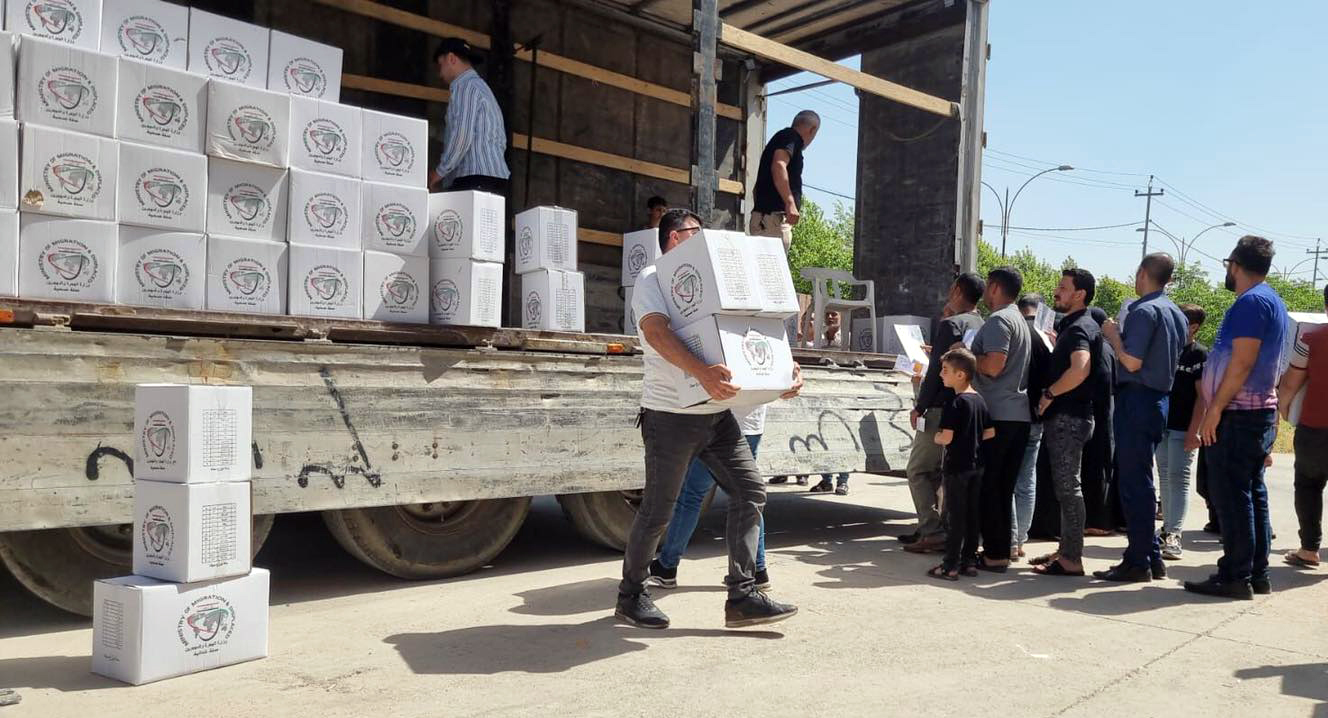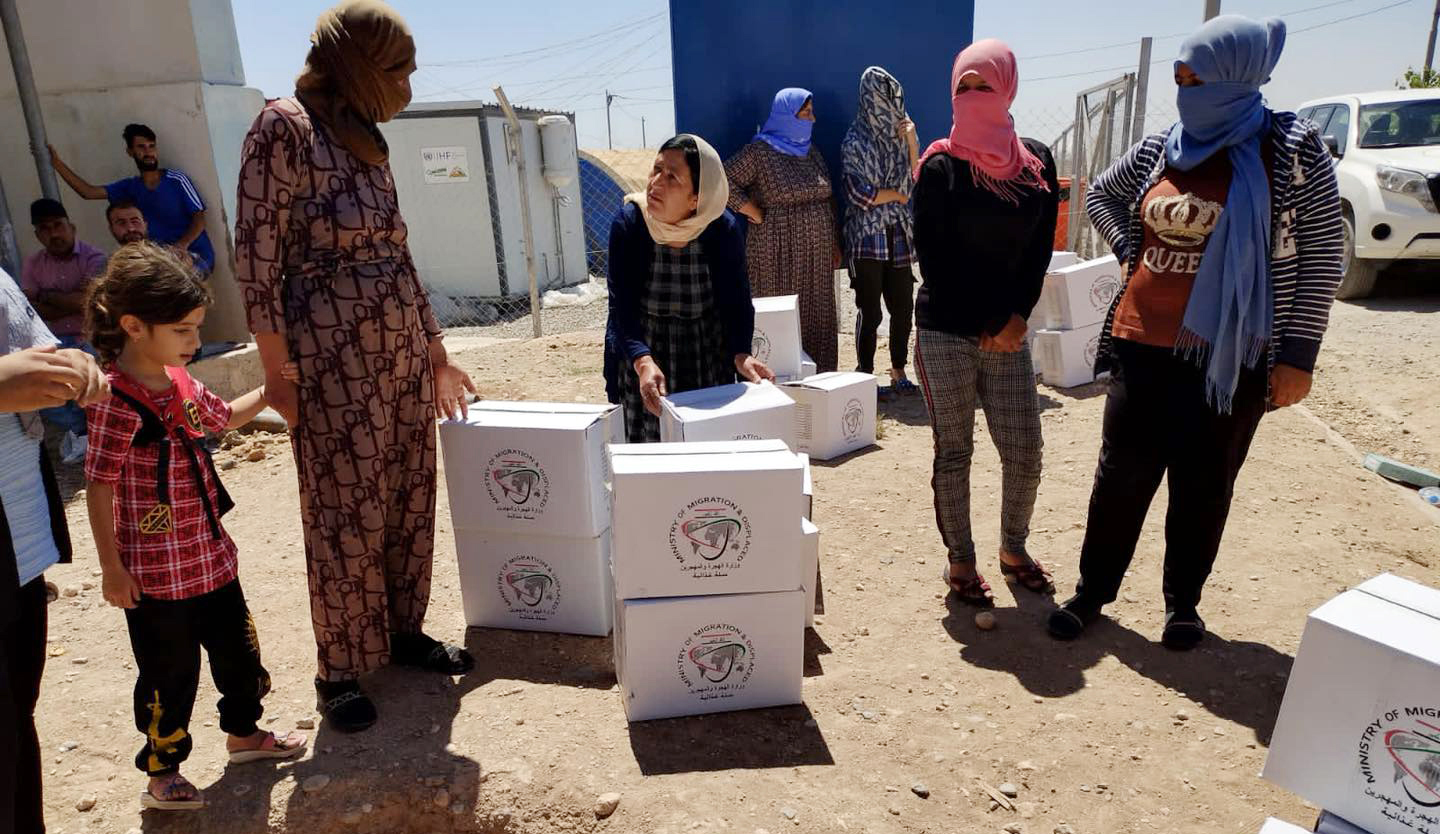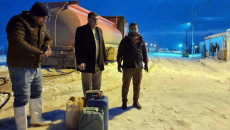Sada Elias has received only two food boxes from the Iraqi government in the past seven months, but has not used any of it, selling some cheaply and throwing away others.
Elias, mother of three children, depends on her husband's daily income as construction laborer and is desperately in need for the food boxes distributed by the government every few months, but she was forced to give it up and buy food at higher prices in the markets.
“We received the last ration of food last May but the food was expired, so we could not use any of it and bought food from abroad,” she desperately told KirkukNow.
According to Elias, who has been living in Khanky camp for the internally displaced persons IDPs in Duhok Northern Province for eight years, the items included in the food boxes lately provided by the Iraqi Ministry of Migration and Refugees to the IDPs has never been edible.
I wonder if they don't think that this food is given to children and the elderly and may cause dozens of diseases
The Iraqi federal government's May food for the IDPs residing tents in camps consists of five kilograms of rice, three liters of cooking of oil, three kilograms of flour, tomato paste, beans, chickpeas, lentil, sugar and tea.
“I wonder if those people don't think that this food is given to children and the elderly and may cause dozens of diseases,” Elias called on the federal government to solve the problem.
According to KirkukNow's follow up, most of the IDPs in the camps of Duhok are unsatisfied with the quality of the foodstuff distributed by the Iraqi government.
Pir Alo Kachal, director of Khanky camp in Sumel district of Duhok, which houses more than 14,000 IDPS, affirmed, “The quality of the food has changed a lot since the outbreak of coronavirus (from mid-2020). The IDPs are directing their complaints to us and we will convey them to our superiors.”
Each displaced family has one or more food coupons; Each coupon will give them one carton of food and one carton of dishwashing stuff, which have been distributed twice in 2022.
“Expired food has not been distributed to the IDPs, but it is not of good quality and is not edible, which is the case in all camps,” said the director of Khanky camp. Although Elias insisted some of the items were expired yet she had had not stored any of it to present it to KirkukNow reporter and local officials.
The Iraqi government's poor food quality comes at a time when international organizations have reduced or suspended aid to IDPs in the Kurdistan Region, including the World Food Program (WFP) which recently has decided to suspend the monthly financial assistance to IDPs.
There are more than 664,000 IDPs in the Kurdistan Region of Iraq KRI, some of whom are staying in 26 camps in Duhok, Erbil and Sulaymaniyah provinces.
"The quality of the food we receive is very bad. I did not use it when I received it. I sold a carton for 10,000 dinars abroad, while the food in the carton costs about $50," said Faisal Ali, an IDP in Chammishko camp located in Zakho district, house for over 21,000 IDPs.
The oil smells very bad, the beans are still hard no matter how much you boil it, the rice is very fine grained and turns into paste when cooked
"The food is not expired, but it is not suitable for eating. The oil smells very bad. The beans are still hard no matter how long you boil it, the same for the chickpeas. The cleaning materials are the poorest and cheapest in the markets” Ali added.
“We are poor IDPs and they give us anything that is bad and of poor quality.”
KirkukNow reporter asked a number of food stuff traders and shops to find out more about the quality of food given to the IDPs.
Fares Briam Gamur, an IDP in Chammishko camp, has been buying food and cleaning materials from the IDPs for more than five years to sell them in the markets for a small margin.
"80% of the IDPs don't eat the food and sell it."
Once distributed by the government, Gamur buys about 60 cartons daily that people sell at a price of 10,000 to 12,000 Iraqi dinars IQD (USD6-8) per carton, which he then sells at markets outside the camp for about 14,000 IQD.

The subsidized food ration is a policy followed by the Iraqi government since 1970s once Iraq was a socialist country with a central economy run by the state. As a member of the Oil Producing and Exporting Countries, Iraq sells 3-4 million barrels of crude oil per day, generating billions of dollars for the Iraqi government which completely relies on oil revenues.
The state provides subsidized food ration and fuel at petrol stations yet the quality of the food stuff is poor due to corruption and mismanagement.
The food ration system allowed Iraqis to monthly obtain subsidized sugar, flour, rice, powdered milk, cooking oil, tea, beans, baby milk, soap and detergent.
Though the system has continued even after the fall of the Saddam Hussein government in 2003, there have been calls to eliminate or limit its scope.
Iraqi officials have resisted scrapping the program altogether for fear of a public backlash as the majority of Iraqis are state-employed and cannot afford buying food stuff from the private sector.
Instead, they have opted for a gradual decrease in subsidized food items.
“The food is not expired but it is not edible. It is so bad. In the May food, the oil smelled very bad, the tea had no color or taste, the beans were not cooked and the rice was distributed badly,” Gamur said.
Dyan Jaafar, director of the Duhok Migration and Crisis Response Office, assured the food is not expired but the quality is poor.
He says they have agreed with a local charity organization to inspect the Iraqi government's food boxes ahead of distributing it and if the quality is not approved, they will not allow its distribution.
The food is not expired but it is not edible
The Iraqi Ministry of Migration has received the complaints of the displaced and promised to solve the problem in the coming months.
Iskandar Mohammed Amin, director of the Iraqi Migration and Displaced Office in Duhok province, agreed the quality of the food is not high, but “the same type of food is distributed monthly to Iraqi citizens and it is edible. However, the ministry is to provide better quality stuff in the coming months.”
He also denied that any expired food had been distributed to the IDPs, affirming that all the items have been tested.
According to the ministry's promise, new food rations will be distributed to the IDPs residing the camps next September.
Except for Ninewa, all camps in other Iraqi provinces have been closed and their residents have been returned to their home towns, except for the camps in the Kurdistan Region, which remained open according to an agreement between Baghdad and Erbil.






